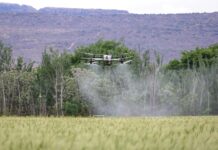HARRISBURG, Pa. – Many Pennsylvanians will begin seeing signs of new life in the outdoors as migratory birds move north and other wildlife comes out of hibernation. Among the wildlife coming out of winter slumber will be Pennsylvania’s roughly 14,000 black bears, all of which will be looking for food.
Now that bears are found throughout a large part of the state, Mark Ternent, Pennsylvania Game Commission black bear biologist, said that bear sightings are common during this time of year.
Bears on the move. Food for bears is typically scarce in the spring until vegetation begins to green-up, but bears emerging from dens need to find food after fasting for several months. Thus, sightings and, in some cases, conflicts increase as bears look for food, including in backyards.
“With bears on the move, those residents in areas with known bear populations should consider reducing the likelihood that their properties will attract bruins,” Ternent said. “While bears are, for the most part, timid animals that would sooner run than fight, people need to understand a few things about how they should react if they encounter a bear, or better yet, how to avoid an encounter all together by reducing the likelihood of attracting bears to your camp or residence.
Feeding wildlife, whether the activity is intended for birds or deer, has the potential to draw bears into a certain area. And once bears become habituated to an area where they find food, they will continue to return to this area, which is when bears become a problem for homeowners and neighbors, Ternent said.
Relocating doesn’t work. Ternent noted capturing and moving bears that have become habituated to humans is a costly and sometimes ineffective way of addressing the problem, especially when faced with the possibility of merely moving a problem bear from one area to another. That is why wildlife agencies around the country tell people that a “fed bear is a dead bear.”
Ternent also listed five suggestions that could prevent attracting bears to a property:
Play it smart. Do not feed wildlife. Food placed outside for wildlife, such as corn for squirrels, may attract bears. Even bird feeders can become “bear magnets.” And, while bird feeding during the winter months may have been appropriate, it may be time to rethink your bird feeding plans as bears start coming out of their dens.
Audubon Pennsylvania offered tips for how to safely feed birds for those in prime bear areas, including: avoid foods that are particularly attractive for bears, such as sunflower seeds, hummingbird nectar mixes or suet; bring feeders inside at night; or suspend feeders from high crosswires.
Keep it clean. Don’t put out garbage until pick-up day; don’t throw table scraps out back; don’t add fruit or vegetable wastes to your compost pile; and clean your barbecue grill regularly.
If you have pets and feed them outdoors, consider placing food dishes inside overnight. Encourage your neighbors to do the same.
Keep your distance. If a bear shows up in your backyard, stay calm. Shout at it like you would to chase an unwanted dog. Don’t approach it. If the bear won’t leave, call the nearest game commission office or local police department for assistance.
Eliminate temptation. Bears that visit your area are often drawn there. Neighbors need to work together to reduce an area’s appeal to bears. Promptly report road-killed deer to ensure their quick removal. Ask area businesses to keep dumpsters closed and bear-proofed (chained or locked shut).
Check please! If your dog is barking, or cat is clawing at the door to get in, try to determine what has alarmed your pet. But do it cautiously, using outside lights to full advantage and from a safe position, such as a porch or an upstairs window.
All unrecognizable outside noises and disturbances should be checked, but don’t do it on foot with a flashlight. Black bears blend in too well with nighttime surroundings providing the chance for a close encounter.
Pennsylvania’s bear population has been increasing for years, and currently is estimated to be near 14,000. Last year, hunters harvested 3,063 bears, and 312 bears were reported killed on highways.
Give them respect. “As a result of Pennsylvania’s large human and bear populations, bears and people are coming into contact more frequently,” Ternent said. “These encounters are occurring because human developments are encroaching into bear habitat and some bears have learned to associate residential areas with food. Chance encounters in the field also appear to be more common than before in some areas.”
Ternent noted that although bears are not strangers to Pennsylvanians, bears are misunderstood by many.
“Bears needn’t be feared, nor should they be dismissed as harmless. They simply need to be respected,” Ternent said. He stressed that in the past 25 years fewer than 15 people have been injured by bears in Pennsylvania, and there are no known records of a Pennsylvania black bear killing a human.
“Black bear aggression is most often the result of a human threatening a bear, its cubs, or a nearby food source, and the best reaction is to reduce that threatening appearance by leaving the area in a quiet, calm manner,” Ternent said. He also advised:
“Learning about bears and being aware of their habits is a responsibility that comes with living in rural and suburban Pennsylvania or recreating in the outdoors,” Ternent said.









